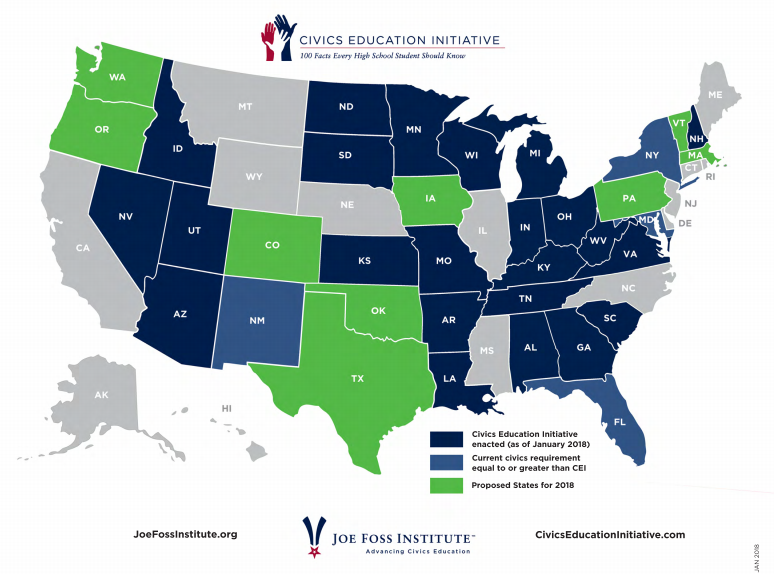In Iowa, All High School Graduates Might First Have to Take a Citizenship Test. Can You Answer These 15 Questions?

Who was president during World War I? Name one author of the Federalist Papers. If both the president and the vice president can no longer serve, who becomes president?
These are three questions that can appear on the occasionally daunting test that’s required to become a citizen of the United States and — in some states — graduate from high school.
Lawmakers in Iowa have proposed a bill that would make the state the latest to require some form of the citizenship test as a high school graduation requirement. Lawmakers in Nebraska are considering a similar bill.
To become a citizen, candidates have to answer six of 10 questions from a pool of 100 possible items. States have adopted different versions of the test; the proposal in Iowa would require students to score 60 percent on the test, though it’s not clear how many questions the test would include. Similar proposals have previously failed in Iowa.
Research suggests Americans could use some civics education. A study released last year by the Annenberg Public Policy Center found that more than a third of American adults couldn’t name one First Amendment right, and 75 percent couldn’t name the three branches of government.
Social studies instruction often takes a back seat amid the intense focus on high-stakes testing in math and reading, Rep. Walt Rogers, a Republican who introduced the bill in Iowa, told NPR. That’s why he thinks the state should require the test. He said it should be “fairly easy” for students to pass, as they can take the test as many times as necessary for them to pass it between seventh grade and high school graduation.
“It’s common sense that kids today should have an understanding of basic U.S. civics,” Rogers told the Des Moines Register.

Every state requires some civics education in schools, but not all of them require students to be tested on what they learn. According to the Joe Foss Institute, which advocates for civics education, 28 states have passed legislation requiring a form of the citizenship test or other accountability measure for civics education, and nine others are considering laws this year.
Could you pass the citizenship test?
Here are 15 sample questions. See if you could become a citizen — or graduate from high school in 28 states! (The answers are below … no peeking!)
1. How many amendments does the Constitution have?
2. What is the name of the first 10 amendments to the Constitution?
3. What is one right or freedom in the First Amendment?
4. What stops one branch of government from becoming too powerful?
5. The House of Representatives has how many voting members?
6. If both the president and the vice president can no longer serve, who becomes president?
7. How many justices are on the Supreme Court?
8. Who is the Chief Justice of the United States now?
9. Under our Constitution, some powers belong to the states. What is one power of the states?
10. Who is the governor of your state?
11. The Federalist Papers supported the passage of the U.S. Constitution. Name one of the writers.
12. What did Susan B. Anthony do?
13. Who was president during World War I?
14. Before he was president, Dwight Eisenhower was a general. What war was he in?
15. Name one state that borders Canada.
Answers
- How many amendments does the Constitution have? (27)
- What is the name of the first 10 amendments to the Constitution? (Bill of Rights)
- What is one right or freedom in the First Amendment? (speech, religion, assembly, press, petition the government)
- What stops one branch of government from becoming too powerful? (checks and balances, or separation of powers)
- The House of Representatives has how many voting members? (435)
- If both the president and the vice president can no longer serve, who becomes president? (the Speaker of the House)
- How many justices are on the Supreme Court? (nine)
- Who is the Chief Justice of the United States now? (John G. Roberts Jr.)
- Under our Constitution, some powers belong to the states. What is one power of the states? (provide schooling and education, provide protection [police], provide safety [fire departments], give a driver’s license, approve zoning and land use)
- Who is the governor of your state? (Check here. District of Columbia residents should answer that D.C. does not have a governor.)
- The Federalist Papers supported the passage of the U.S. Constitution. Name one of the writers. (James Madison, Alexander Hamilton, John Jay, Publius)
- What did Susan B. Anthony do? (fought for women’s rights, fought for civil rights)
- Who was president during World War I? (Woodrow Wilson)
- Before he was president, Dwight Eisenhower was a general. What war was he in? (World War II)
- Name one state that borders Canada. (Maine, New Hampshire, Vermont, New York, Pennsylvania, Ohio, Michigan, Minnesota, North Dakota, Montana, Idaho, Washington, Alaska)
For the full test, click here.
Get stories like these delivered straight to your inbox. Sign up for The 74 Newsletter

;)
